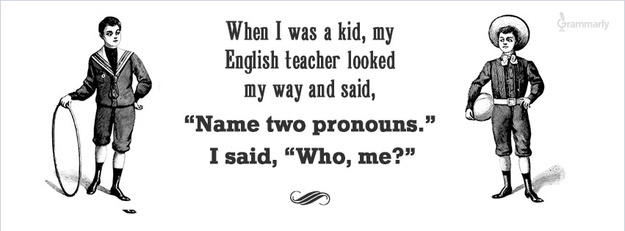|
Having trouble viewing this message? Click here to view it online.
To unsubscribe or change contact details, scroll to the bottom and follow the link.
|



|
Picking Proper Pronouns: Part II
|
|
Last week we began our review of using pronouns that help guide rather than trip our written eloquence. We started with pronouns as clause subjects, for objects, before assertive or attributive expressions, and after than or as.
Today we'll look at pronouns before a gerund, for an infinitive, and for complements of forms of the verb be.
Pronoun before a gerund
When a pronoun appears before a gerund, we will most often use the possessive case unless we wish to emphasize the pronoun more than the gerund.
Emphasis Gerund: They disapproved of his evading the issue in that way. [They disapproved of the act of evading the issue more than they disapproved of the person.]
Emphasis Pronoun: They disapproved of him evading the issue in that way. [They disapproved of the person evading the issue more than they disapproved of the act.]
This is a subtle but noteworthy distinction that may appear more often in writing than in speech. With speech, we'll find the speaker might use one form or the other depending on choice in the moment.
Pronoun for an infinitive
Use the objective case for the subject, object, or complement of an infinitive phrase.
Mariah requested him to assist her.
Him is the subject and her is the object of the infinitive to assist. The phrase him to assist her is the direct object of the verb requested.
This is a different construction from Mariah requested that he assist her. The dependent clause that he assist her does not include an infinitive; rather, it applies the subjunctive.
Pronoun for the complement of be
If our construction is a subject, a conjugated form of be (e.g., is, was, were), and a subject complement, we use the subjective case.
Incorrect: It was them who made the decorations.
Correct: It was they who made the decorations. [They is the subject complement of it after the linking verb was.]
As we can see, using the right pronouns strengthens smart, persuasive writing—and that, in the end, is a great reward of our art.
|
View and comment on this
article on our website.
|
|
Pop Quiz
Using what you've learned in this article, choose the correct pronoun in each sentence.
1. We agree with [them/their] passing the proposal. (Emphasis on the act rather than the acting agent)
2. I'm fully against [him/his] wanting to borrow more money from us. (Emphasis on the acting agent rather than the act)
3. The delivery service hired [he/him] to support [them/they].
4. The winner of the grand prize is [she/her].
|
Free BONUS Quiz for You!
Friend, because you are a subscriber to the newsletter, you get access to one of the Subscribers-Only Quizzes. Click here to take a Subjunctive Mood Quiz and get your scores and explanations instantly!
We will be adding many more quizzes this year to our already substantial list of quizzes. If you have suggestions for topics we have not yet covered, please send us a message at help@grammarbook.com.
|
Hundreds of Additional Quizzes
at Your Fingertips
Subscribe now to receive hundreds of additional English usage quizzes not found anywhere else!
Teachers and Employers
Save hours of valuable time! You may assign quizzes to your students and employees and have their scores tallied, organized, and reported to you! Let GrammarBook.com take the hassle out of teaching English!
"Fun to test my skills."
"The explanations really help ... thanks!"
"I can select the quizzes to assign to my students, and then the results are reported to me automatically!"
|

|
Don't need all the quizzes?
You can now purchase the same quizzes individually for ONLY 99¢ each.
Purchase yours here. |
If you think you have found an error in a quiz, please email us at help@grammarbook.com
|
 |
The Blue Book of Grammar and Punctuation
by Jane Straus, Lester Kaufman, and Tom Stern |
The Authority on English Grammar! Eleventh Edition Now Available
An indispensable tool for busy professionals, teachers, students, homeschool families, editors, writers, and proofreaders.
Available in print AND as an e-Book! Over 2,000 copies are purchased every month!
The publisher of The Blue Book, Jossey-Bass, A Wiley brand, is offering a 35 percent discount for those of you who order the book through Wiley.com. Shipping and tax are not included. Simply go to bit.ly/1996hkA and use discount code E9X4A.
Offer expires December 31, 2020.
|
Wordplay

Pop Quiz Answers
1. We agree with [them/their] passing the proposal. (The possessive pronoun their emphasizes the act of passing the proposal.]
2. I’m fully against [him/his] wanting to borrow more money from us. (The objective pronoun him emphasizes being against the person wanting to borrow money more than the act of borrowing it.)
3. The delivery service hired [he/him] to support [them/they]. (Infinitive phrases use the objective case for subjects, objects, and complements. In this infinitive phrase, him is the subject and them is the object of the infinitive to support. The full phrase him to support them is the direct object of the sentence.)
4. The winner of the grand prize is [she/her]. (She is the subject complement of winner following the linking verb is.)
|
 |
English In A Snap:
68 One-Minute English Usage Videos FREE |
Learn all about who and whom, affect and effect, subjects and verbs, adjectives and adverbs, commas, semicolons, quotation marks, and much more by just sitting back and enjoying these easy-to-follow lessons. Tell your colleagues (and boss), children, teachers, and friends. Click here to watch.
|
|